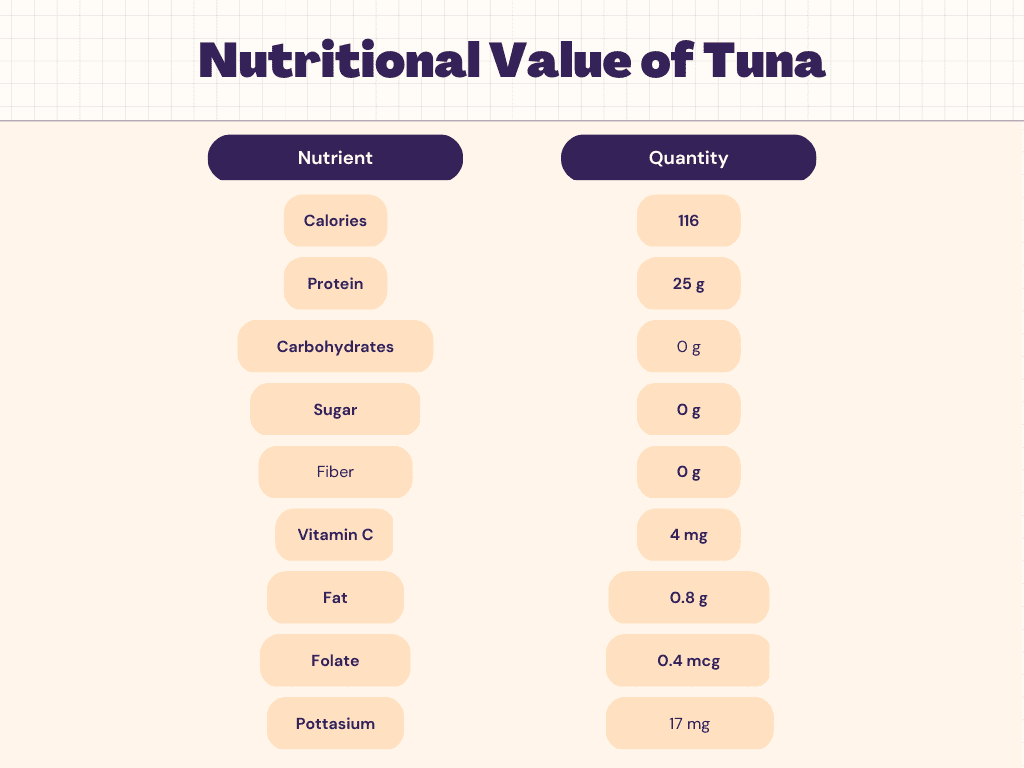Tuna is a popular fish that has become a staple in many diets due to its numerous health benefits and delicious taste. Not only is it a low-fat and low-calorie option for those watching their weight, but it is also packed with essential nutrients like protein, omega-3 fatty acids, and various vitamins and minerals. This makes it an excellent choice for individuals looking to improve their overall health or maintain a healthy diet. In this article, we will delve into the nutrition of tuna, specifically its calorie, protein, and carb content, to help you better understand how it can contribute to a healthy and balanced diet.
Nutritional Value of Tuna
Nutritional Facts of Tuna
Carbs In Tuna
Tuna is a low-carb food that contains virtually no carbohydrates, making it an excellent choice for individuals following a low-carb or ketogenic diet. Unlike many other sources of protein, such as meat or dairy products, which often contain significant amounts of carbohydrates, tuna is a pure source of protein and healthy fats. This makes it an ideal choice for those looking to maintain healthy blood sugar levels or lose weight. Additionally, the lack of carbohydrates in tuna means that it is a low glycemic index food, which means that it does not cause a rapid spike in blood sugar levels. Overall, tuna is an excellent source of protein and healthy fats, and its low-carb content makes it an ideal food for individuals looking to maintain a healthy and balanced diet.
Protein In Tuna
Protein is an essential nutrient that is necessary for the growth and maintenance of tissues in the body, and tuna is a great source of protein. Tuna is a saltwater fish that is widely consumed all over the world. It is rich in high-quality protein, containing about 25 grams of protein in a 3-ounce serving. Protein in tuna is particularly important for people who follow a vegetarian or vegan diet and may struggle to consume enough protein from plant-based sources alone. Tuna is also a rich source of omega-3 fatty acids, which are important for brain health and may help to reduce the risk of heart disease. When choosing tuna, it is important to look for sustainably sourced options and to limit consumption due to concerns about mercury content. Overall, protein in tuna is an excellent addition to a healthy, balanced diet.
Health Benefits Of Tuna
Tuna can provide a number of health benefits for individuals with PCOS, diabetes, and thyroid conditions, and those seeking to lose weight.
- PCOS: Polycystic Ovary Syndrome (PCOS) is a hormonal disorder that can affect reproductive health and increase the risk of other health issues. Tuna is a great source of protein that can help regulate blood sugar levels and improve insulin sensitivity, which can be beneficial for women with PCOS. Check our PCOS Plans here.
- Diabetes: Tuna is also an excellent choice for individuals with diabetes, as it is a low glycemic index food that can help stabilize blood sugar levels. The protein in tuna can also help slow down the absorption of carbohydrates, which can prevent blood sugar spikes. Check our Diabetes Plans here.
- Thyroid: Tuna is rich in selenium, a mineral that is important for thyroid health. Selenium helps regulate the production of thyroid hormones and supports the immune system. Check our Thyroid Plans here.
- Weight Loss: Tuna is a low-calorie, high-protein food that can be a great addition to a weight loss diet. The protein in tuna can help reduce appetite and promote feelings of fullness, which can help with weight management. Check our Weight Loss Plans here.
Vitamins & Minerals in Tuna
Tuna is a nutrient-dense food that contains a variety of important vitamins and minerals. Here are some of the main vitamins and minerals found in tuna:
- Protein: Tuna is an excellent source of protein, containing about 25 grams of protein in a 3-ounce serving.
- Omega-3 Fatty Acids: Tuna is rich in omega-3 fatty acids, which are important for brain health, reducing inflammation, and may help to reduce the risk of heart disease.
- Vitamin D: Tuna is a good source of vitamin D, which is important for bone health, and immune function, and may reduce the risk of certain diseases.
- Selenium: Tuna is rich in selenium, which is important for thyroid health, and immune function, and may have anti-cancer properties.
- Vitamin B12: Tuna is a good source of vitamin B12, which is important for nerve function, red blood cell production, and DNA synthesis.
- Potassium: Tuna is a good source of potassium, which is important for muscle and nerve function, and can help regulate blood pressure.
Overall, tuna is a nutrient-dense food that provides a variety of important vitamins and minerals that are essential for optimal health. It is important to choose sustainably sourced tuna and to limit consumption due to concerns about mercury content.
The Bottom Line
Tuna is a nutritious food that provides a range of health benefits. It is a rich source of high-quality protein, omega-3 fatty acids, vitamin D, selenium, vitamin B12, and potassium. These nutrients can provide various health benefits such as regulating blood sugar levels and improving insulin sensitivity, supporting thyroid and immune function, reducing inflammation, and promoting heart and brain health. However, it is important to choose sustainably sourced tuna and to limit consumption due to concerns about mercury content. Tuna can be a healthy addition to a balanced diet for individuals with conditions such as PCOS, diabetes, and thyroid issues, and those seeking to manage their weight.
Faqs
How much Tuna can I eat in a day?
The amount of tuna one can safely consume in a day depends on several factors, including a person’s age, weight, gender, and overall health.
The Food and Drug Administration (FDA) recommends that individuals eat up to 2-3 servings of fish per week, with each serving being about 3-4 ounces. For pregnant women, the recommendation is to limit tuna intake to no more than 2 servings per week due to concerns about mercury content.
Mercury is a toxic metal that can accumulate in fish, including tuna, due to environmental contamination. Consuming high levels of mercury can be harmful to health, especially for pregnant women and children.
Therefore, it is important to choose tuna that is sustainably sourced and lower in mercury, such as skipjack or light canned tuna. Albacore and yellowfin tuna tend to have higher mercury levels, so it is best to limit the consumption of these types of tuna.
If you have any health concerns, it is best to consult with a healthcare professional or a registered dietitian for personalized recommendations on the amount of tuna that is safe and appropriate for your individual needs.
Should I eat Tuna before or after exercise?
Both before and after exercise can be good times to consume tuna, depending on your individual needs and preferences.
Eating tuna before exercise can provide a good source of protein to help fuel your muscles during your workout. Protein can also help reduce muscle breakdown and promote muscle recovery after exercise. However, consuming a heavy meal, including tuna, right before exercising may cause discomfort or interfere with your performance. Therefore, it’s best to eat at least 1-2 hours before exercise to allow for proper digestion.
Eating tuna after exercise can help promote muscle recovery and repair. The protein in tuna can help rebuild muscle tissue that may have been damaged during exercise, and the omega-3 fatty acids can help reduce inflammation and promote healing. Eating a meal containing protein and carbohydrates within 30 minutes to an hour after exercise can help replenish energy stores and promote muscle recovery.
Ultimately, the timing of tuna consumption before or after exercise depends on your individual needs and preferences, as well as the type and duration of exercise. It is best to listen to your body and consume tuna at a time that works best for you.
What are the benefits of Tuna?
Tuna is a nutrient-dense food that provides a variety of health benefits. Here are some of the key benefits of tuna:
- Rich in Protein: Tuna is an excellent source of high-quality protein, which is essential for building and repairing muscles and tissues.
- Source of Omega-3 Fatty Acids: Tuna is rich in omega-3 fatty acids, which are important for brain health, reducing inflammation, and may help to reduce the risk of heart disease.
- Vitamin D: Tuna is a good source of vitamin D, which is important for bone health, and immune function, and may reduce the risk of certain diseases.
- Selenium: Tuna is rich in selenium, which is important for thyroid health, and immune function, and may have anti-cancer properties.
- Vitamin B12: Tuna is a good source of vitamin B12, which is important for nerve function, red blood cell production, and DNA synthesis.
- Potassium: Tuna is a good source of potassium, which is important for muscle and nerve function, and can help regulate blood pressure.
- Weight Management: Tuna is low in calories and high in protein, which can help with weight management by reducing appetite and promoting satiety.
- Reduced Risk of Chronic Diseases: Tuna consumption has been associated with a reduced risk of chronic diseases, such as heart disease, diabetes, and certain types of cancer.
It is important to choose sustainably sourced tuna and to limit consumption due to concerns about mercury content. However, incorporating tuna into a balanced diet can provide various health benefits and support overall health and wellness.
What is the best time to eat Tuna?
There is no one-size-fits-all answer to the best time to eat tuna as it depends on an individual’s lifestyle, preferences, and dietary goals. However, here are some tips to consider:
- As a meal: Tuna can be consumed as a part of a healthy meal, such as lunch or dinner, along with vegetables, whole grains, or other healthy foods.
- As a snack: Tuna can be a convenient and portable snack, especially when packed in a can or pouch. It can be consumed alone or combined with other healthy snacks, such as crackers, veggies, or fruits.
- Before or after exercise: Tuna can be consumed before or after exercise, as it is a good source of protein and omega-3 fatty acids, which can help with muscle recovery and repair.
- In the morning: Tuna can be a good option for breakfast, especially when combined with other healthy breakfast foods, such as eggs, avocado, or whole-grain bread.
Ultimately, the best time to eat tuna depends on individual needs, preferences, and lifestyles. It’s essential to incorporate tuna into a balanced diet and choose sustainably sourced options to reap the health benefits it provides.










